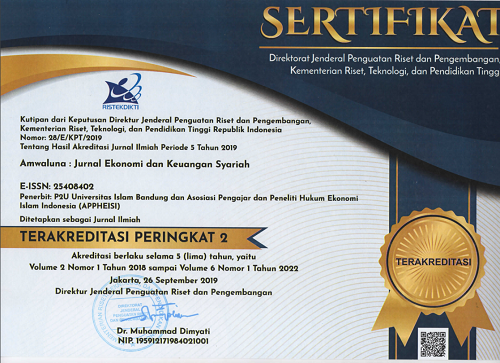The Effects Of Risk Based Bank Rating On Stock Return During Covid-19 Of BUKU IV Banks In Indonesia
Abstract
Keywords
Full Text:
PDFReferences
Ananda, Nurdin and Azib. (2017). Pengaruh Penilaian Tingkat Kesehatan Bank Berbasis RBBR Terhadap Return Saham 2013 – 2015.
Asna and Nu. (2006). Analisis Pengaruh Rasio Keuangan Terhadap Return Saham Perbankan Yang Terdaftar Di Bursa Efek Jakarta.
Bank Indonesia Circular Letter No. 13/24/DPNP/2011
Biro Pusat Statistik, (2019), PDB Indonesia Triwulanan 2016-2020.
Bloomberg.com, (2020, 30 December). Ten Ways Covid-19 Has Changed the World Economy Forever.
Bodie, Z., Kane, A., & Marcus, A. (2014). EBOOK: Investments-Global edition. McGraw Hill.
Chitya, C. (2015). Pengaruh NPL, LDR, CAR Terhadap Profitabilitas Bank Umum Swasta Nasional Devisa. Science and Management Research, 1-16.
Dahar, I. P. S. R. (2016). Analisis Tingkat Kesehatan Bank dengan Menggunakan Model Risk-Based Bank Rating (RBBR)(Studi pada Perbankan yang Listing di Bursa Efek Indonesia Periode 2011-2014). Menara Ilmu, 10(73).
Van Greuning, H., & Iqbal, Z. (2011). Analisis Risiko Perbankan Syariah. Jakarta: Salemba Empat.
Gerald, Ashwinpaul and Dov. (2003). The Analysis and Use of Financial Statements. United States: John Wiley and Sons Inc.
Heryana. (2018). Pengaruh Tingkat Kesehatan Bank dengan Menggunakan Metode Risk-Based Bank Rating Terhadap Return Saham pada Perusahaan Perbankan yang Go Public di BEI.
Oktaviani. (2016). Analisis Pengaruh Tingkat Kesehatan Bank dengan Metode Risk-Based Bank Rating (RBBR) Terhadap Return Saham bank Konvensional yang Terdaftar di BEI Tahun 2012 – 2015.
Otoritas Jasa Keuangan . (2018). Laporan Profil Industri Perbankan. Jakarta.
Otoritas Jasa Keuangan . (2019). Laporan Profil Industri Perbankan. Jakarta.
Otoritas Jasa Keuangan . (2020). Laporan Profil Industri Perbankan. Jakarta.
Otoritas Jasa Keuangan. (2017). Penilaian Tingkat Kesehatan Bank Umum (No 14/SEOJK.03/2017). Jakarta.
Peraturan Bank Indonesia No.15/15/PBI/2013
Praditasari. (2017). Pengaruh tingkat kesehatan bank terhadap return saham pada industri perbankan yang terdaftar di Bursa Efek Indonesia periode 2010-2017.
Sianturi. (2019). Pengaruh tingkat kesehatan bank terhadap return saham pada industri perbankan yang terdaftar di Bursa Efek Indonesia periode 2010-2017.
Syafril, H., & Daryanto, W. M. (2019). SHARIA BANKING IN INDONESIA: WHAT WENT WRONG?. South East Asia Journal of Contemporary Business, Economics and Law, 20(1), 45-57.
Suryani, Y., & Habibie, A. (2017). Analisis Pengaruh Rasio–Rasio Risk Based Bank Rating Terhadap Pertumbuhan Laba Pada Perusahaan Perbankan yang Terdaftar di BEI. KITABAH: Jurnal Akuntansi dan Keuangan Syariah, 1(1).
WHO.int, (2020, 29 June). Listings of WHO’s response to COVID-19. Available from https://www.who.int/news/item/29-06-2020-covidtimeline
DOI: https://doi.org/10.29313/amwaluna.v6i1.9120
Refbacks
- There are currently no refbacks.
Editorial Office:
Syariah Faculty, Universitas Islam Bandung
Jalan Tamansari No. 24-26 Kota Bandung

Amwaluna : Jurnal Ekonomi dan Keuangan Syariah is licensed under a Creative Commons Attribution-NonCommercial-ShareAlike 4.0 International License.







